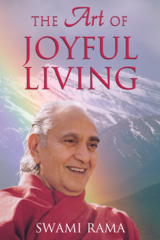Beneath your thinking process lies something even deeper than thoughts—the power of emotion. In your daily life, among your friends and family, both at home and at work, you sometimes realize, or others tell you, that you are too emotional, that you are not emotionally balanced. When this happens, it is because you have not properly understood or organized your emotional life.
Emotions can be powerful in either positive or negative ways. Perhaps, for example, you are driving your car and you suddenly see that a small puppy is caught in a bush and is crying helplessly. The puppy does not belong to you, but if you are in touch with your positive emotions at that time, you may stop and try to help it. Such emotions can lead you to creativity and positive action, but there are also negative emotions, which can lead you to disaster and destroy your life.
For example, when you are upset, disorganized, or emotionally out of control, you say things that you don’t really mean. Later, you’re sorry, but what prompted you to say that negative thing in the first place? You never really meant to hurt anybody, so then you apologize to those you love. You say, “I didn’t mean to hurt you. I love you, and I’m sorry I said that.” But the next day you repeat the same behavior because you do not understand your own emotions. You need to understand what prompted you to become wild and to have that emotional outburst.

Often you leave for work smiling, and then suddenly something happens on your way to work and you become sad. That’s life. You are experiencing the changes and the ups and downs of life all the time. To deal with these changes, you must develop your determination that you will not be emotionally disturbed by events and will not do anything that hurts or harms others.
There have been many great sages, such as Chaitanya Mahaprabhu, Ramakrishna Paramahansa, Saint Bernard, and Saint Teresa, who learned to tap their emotional power in a creative way. If you learn to use your emotions positively, you can attain the highest of joys and happiness.
Someone who knows how to organize, direct, and lead that great emotional power within can attain in a short time the same height of ecstasy as that achieved by yogis who do intense practices for many years to attain samadhi. Both processes are the same, provided you know how to channel your emotions and have learned how to go beyond the mire of delusion created by your own mind and its thinking process. This is possible when you understand the origins of your emotions.
If you learn to use your emotions positively, you can attain the highest of joys and happiness.
First, you must understand the negative emotions, know what they are and from where they arise. The spiritual scriptures of the ancient sages analyzed these negative emotions and categorized them. The first, they say, is kama, the mother of all other desires. Kama is the prime desire. From it arise all the others. Kama gives rise to the desire to satisfy or gratify the senses; it also gives rise to the desire to help others selflessly. Kama motivates you to do anything and everything. But it is blind desire: it has no sense of discrimination, no judgment, no understanding. It motivates you to do something just to fulfill that desire—simply because it exists.
When kama is not fulfilled, you get frustrated—that is krodha, the emotion of anger. When you are angry, then you are completely blind. If you compare yourself to a dog, you will realize that even a dog never loses its temper in the way that you do. When you are frustrated, when your desires are not fulfilled, you can even hurt your children or your wife—those you love so much.

Unfulfilled desire leads to anger. When you get angry it is because something is not fulfilling your desires, and in this fashion you get angry a thousand times a day. A desire creates expectation, and that expectation is strong, so there is constant anger. And when you express your anger it wrecks your nervous system. You start trembling when you are angry; you lose your balance; you lose your tranquility. A complete and accurate definition of anger is the emotion resulting from unfulfilled desires that you have not learned how to arrange, to pacify, or to understand. Thus, anger means that you have some desire that needs to be understood and resolved.
Unfulfilled desire leads to anger.
If, however, your desire has been achieved and kama has been fulfilled, then pride, or muda, results. Your mind thinks, “I have achieved my desire!” This is intoxicating, and when you are under the influence of this intoxication you do not think clearly and you behave badly. Thus, when the desire is fulfilled you become proud, but if it is not fulfilled then you become angry.
Because of this, you need to be careful to observe yourself clearly. When a desire is fulfilled, you should observe whether it feeds your pride, and if it is not fulfilled, observe whether it feeds your anger. You have to watch yourself carefully for these two reactions.
Source: The Art of Joyful Living (Swami Rama)

